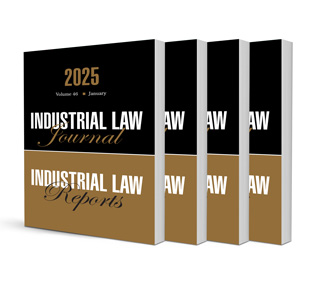The Plight of First Responders Suffering from Mental Disorders: Will an Amended Workers’ Compensation Act Relieve their Predicament?

The Plight of First Responders Suffering from Mental Disorders: Will an Amended Workers’ Compensation Act Relieve their Predicament?
Author Karin Calitz
ISSN: 2413-9874
Affiliations: Professor Emeritus and Research Fellow, Department of Mercantile Law, Stellenbosch University
Source: Industrial Law Journal, Volume 46 Issue 3, 2025, p. 1523 – 1550
Abstract
First responders are at great risk to contract Post Traumatic Stress Disorder (PTSD), because of the nature of their work. This often leads to suicide or homicide-suicide, involving family members.
The process of claiming benefits from the Compensation for Occupational Injuries and Diseases Act 130 of 1993 (COIDA), often exacerbates the PTSD symptoms because the onus of proof that PTSD arose out of and in the course of employment rests on the employee. Claiming compensation often takes years, partly due to the lack of expertise of commissioners and tribunals, leaving employees no other choice but to appeal to the High Court.
Legal comparison indicates that certain provinces in Canada, and some states in the US and Australia, have adopted presumptive legislation which relieves first responders of the onus to prove that PTSD arose out of their employment.
The Compensation for Occupational Injuries and Diseases Amendment Act 10 of 2022 (COIDAA), which is not in force yet, for the first time includes PTSD (but no other mental illness) in the definition of an occupational disease. COIDA’s draft Schedule 3 lists PTSD as an occupational disease that will be covered by a presumption but does not limit the presumption to any categories of injured or diseased employees. This means that any employee suffering from PTSD will be covered by the presumption as soon as it is established that the person suffers from PTSD. In light of the fact that the Compensation Fund (CF) experiences serious financial difficulties, the article agrees that rehabilitation and return-to-work measures introduced by the COIDAA are laudable, but at present financially unattainable. More informal, less costly measures, such as online psychoeducation training of first responders, peer groups and families to recognise the symptoms of PTSD and how to deal with those, can nurture resilience of first responders and empower those closest to them to support them. By ensuring a psychosocial safety climate, employers can do much to prevent PTSD. A code of good practice could include these recommendations.
The article further recommends that the presumption should at first only cover first responders as a matter of urgency until the CF becomes financially viable again.